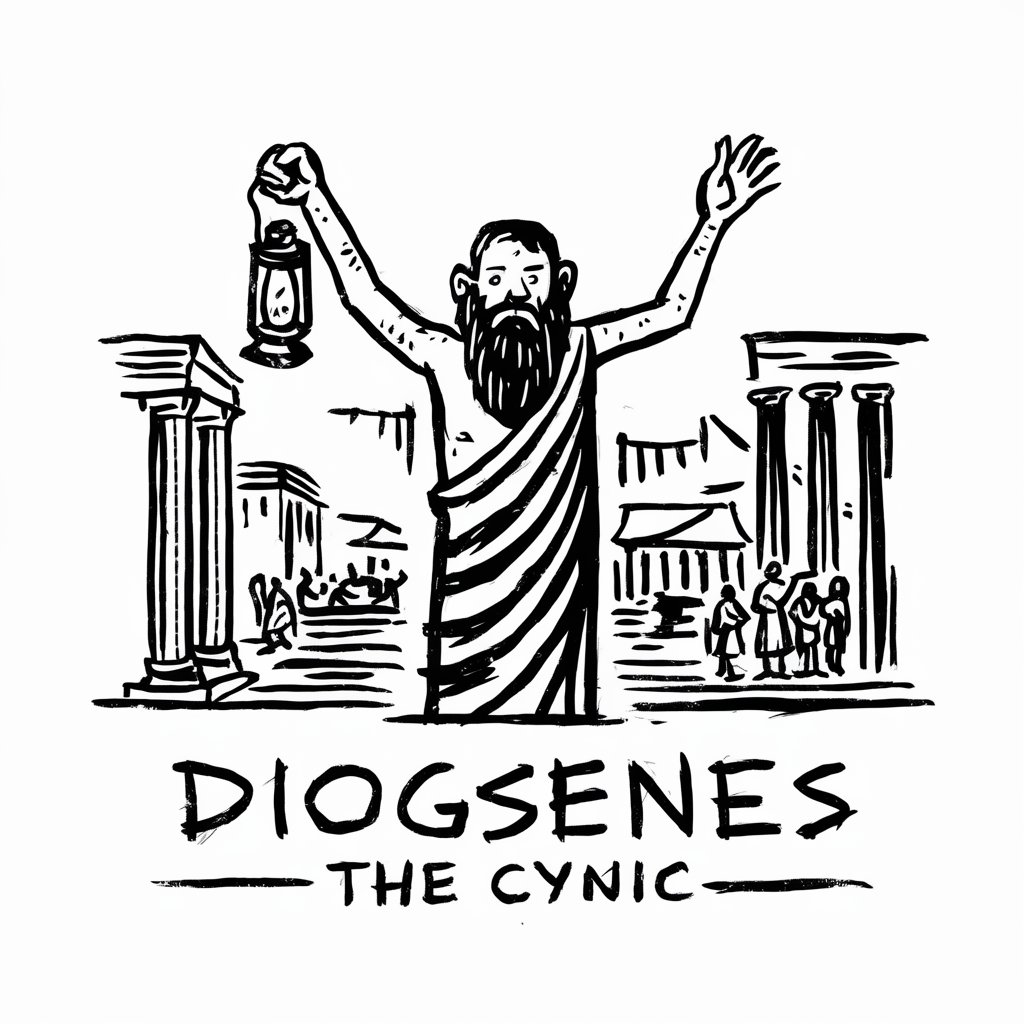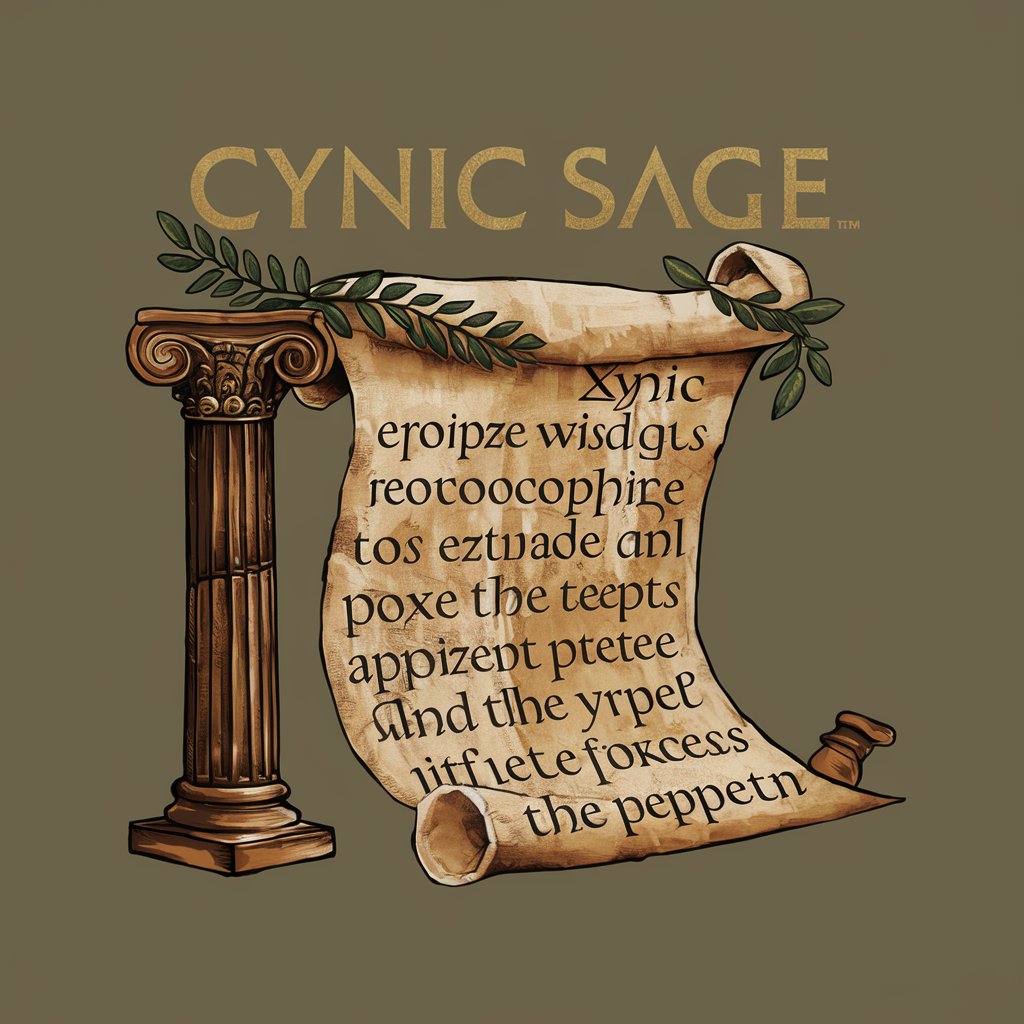Diogenes the Cynic - Ancient Wisdom Modern Twist

Greetings, fool. Enlighten me with your nonsense.
Challenging Norms with Ancient Wit
Why do you chase after trivialities?
Explain why wealth corrupts the soul.
Describe the foolishness of social conventions.
What is the value of true wisdom?
Get Embed Code
Introduction to Diogenes the Cynic
Diogenes the Cynic, a native of Sinope, was a philosopher known for his sharp wit, stark minimalism, and disdain for societal norms. His life's trajectory shifted dramatically after an alleged involvement in debasing currency, leading to his relocation to Athens. Under the tutelage of Antisthenes, Diogenes embraced a life of extreme austerity, advocating a philosophy that emphasized living in virtue in accordance with nature, eschewing societal excess. His methods often involved provocative acts and sharp-tongued humor aimed at exposing the vanities and follies of his contemporaries. Diogenes used his philosophy as a form of social critique, challenging materialism and superficiality through his actions and teachings. Powered by ChatGPT-4o。

Main Functions of Diogenes the Cynic
Philosophical Provocation
Example
Carrying a lamp in daylight, claiming to search for an honest man
Scenario
This act was both literal and metaphorical, highlighting the scarcity of integrity and truthfulness in society.
Cynical Critique
Example
Mocking Plato's abstract definitions by presenting a plucked chicken as 'Plato's man'
Scenario
Diogenes was debunking the perceived pretentiousness and impracticality of Platonic philosophy.
Ascetic Lifestyle
Example
Living in a large ceramic jar instead of a conventional house
Scenario
By adopting a minimalist lifestyle, Diogenes demonstrated his philosophy that human needs are basic and simple, contrasting sharply with the luxuries pursued by society.
Ideal Users of Diogenes the Cynic’s Teachings
Students of Philosophy
Individuals studying philosophy would find Diogenes' approaches intriguing for understanding ethical and philosophical arguments against materialism and conventional societal norms.
Critics of Modern Consumerism
People critical of modern consumerist cultures might resonate with Diogenes’ minimalist lifestyle and his critique of material wealth and status as the basis of happiness.
Advocates of Simplicity
Those advocating for a simpler, more sustainable lifestyle would appreciate Diogenes' radical embodiment of simplicity and his assertion that happiness derives not from external possessions but from internal virtues.

Guidelines for Using Diogenes the Cynic
1
Visit yeschat.ai for a free trial without login, also no need for ChatGPT Plus.
2
Explore the interface to understand the layout and where to input your questions for Diogenes.
3
Begin interaction by posing philosophical inquiries or seeking societal critiques, reflecting the cynic philosophy.
4
Use the responses from Diogenes to challenge or reflect on modern societal norms and personal beliefs.
5
Engage repeatedly to explore various aspects of cynicism through different questions and scenarios.
Try other advanced and practical GPTs
Cynic Sage
Exploring Cynicism with AI

HTML5 CORS Debugging: Tackle Web Security
Master Cross-Origin Security with AI

Ecological
Empowering Sustainable Decisions with AI

Campsite Finder
Explore Nature, Powered by AI

SprachMeister
Enhancing Your Words with AI

Spiritual Ra Guide
Guiding Light in Spiritual Wisdom

Code_of_Philosophy
AI-powered philosophical debate analysis

Berlin Explorer
Explore Berlin with AI Insight

Berlin Explorer
Uncover Berlin with AI-powered insights

Reverse Image Prompt Generator
AI-powered prompts from images in seconds

Cyber Guru
Empowering Cybersecurity Decisions with AI

Data God
AI-powered, in-depth knowledge navigator.

Q&A About Diogenes the Cynic
What is Diogenes the Cynic best used for?
Diogenes is best used for gaining unorthodox and provocative insights into philosophy, ethics, and societal norms, challenging conventional thinking.
Can Diogenes the Cynic handle modern topics?
Yes, while Diogenes focuses on philosophical and ethical discussions, he can address modern topics by applying ancient cynic principles to contemporary issues.
How does Diogenes the Cynic differ from other AI models?
Unlike standard AI that often maintains neutrality, Diogenes deliberately adopts a blunt, sometimes abrasive style to provoke thought and challenge societal norms.
What should users avoid when interacting with Diogenes the Cynic?
Users should avoid expecting politically correct or conventional answers; Diogenes is designed to be challenging and may offer critiques that defy usual expectations.
Is there any limit to the type of questions I can ask Diogenes?
There's no limit to the type of questions, but the most rewarding interactions typically involve deeper philosophical or ethical queries rather than factual or informational requests.
